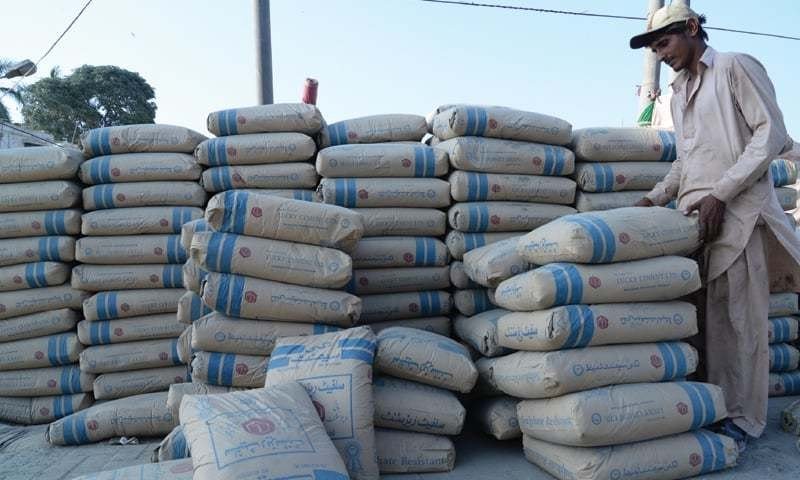The inability to meet market demand for cement coupled with low production volume by major cement companies in Nigeria have driven prices up by 35 per cent.

Investigation indicated that a 50kg bag of cement, which cost between N2,400 and N2,600 as of September this year now sells for N3,500.
Stakeholders attributed the recent hike in price which started in October this year to insufficient supply of the product that resulted in artificial scarcity.
It was gathered that though the price of cement from the factories had not changed, retailers and distributors were profiting from the poor supply by increasing prices.
The Lead Partner, Felizab Global Services Limited, Oluwademi Babalola, claimed that glitches in software that controls the movement of Dangote Cement truck in and out of the production plant had hampered the supply of cement to distributors.
Babalola, a construction block maker, said, “Cement price hike comes whenever there is a traffic jam in the network of the cement company. There is a software that controls the inflow and outflow of cement trucks from the distribution company.”
He said the current market price had affected existing contracts that had been signed with building contractors at the beginning of the year, saying his company had to supply the contractors building blocks at a loss because the price of block remained unchanged at N220.

“I have a company that paid me to supply 40,000 blocks at N200 per block. All of a sudden, the price of cement started jacking up. Now from N2,400 to N3,100 to N3,300, the price of those blocks has not changed but there’s a great loss,” Babalola added.
A retailer, who simply identified himself as Malik, corroborated Babalola’s claims, saying Dangote, which has the highest market share, Lafarge and other cement companies created artificial scarcity by not supplying the distributors the volume they requested.
He reiterated that demand/supply gap had caused a hike in market price of cement.
He said, “The problem is from Dangote and other cement manufacturers. They’ve created artificial scarcity. It’s not like they’ve increased the price; the prices are the same. “Now if you pay for 10 trucks and you get three or four, what happens is that you will naturally increase the price of your cement. So it’s caused by Dangote and all other cement manufacturers.”
“If you’re producing cement and your cement is everywhere, naturally your price will come down. The demand is there but you cannot meet up with the demand because the cement companies have caused artificial scarcity,” he added.
A distributor, who wanted to remain anonymous said she buys 50kg Lafarge cement for N2,600 from the depot but sells at N3,200, depending on the daily price.
She attributed the low production to the COVID-19 pandemic and scarcity of dollar, which would be needed for the importation of raw materials.
“The price hike is as a result of the low production in the cement companies, which started October ending, and the aftermath of COVID-19. Don’t forget that the dollar naira rate is a problem also; materials are now expensive and scarce,” she added.
Another distributor who preferred to be anonymous said, “People are asking for cement, demand is there but no cement to supply. The scarcity has been for the past four months now.”
Founder and Chairman of BUA Group, Abdul Rabiu, while speaking during his induction as Fellow of the Institute of Director on Sunday explained that Nigeria’s cement industry was currently producing 28 million metric tonnes of cement per annum, creating 32 million metric tonnes gap in production volume.
According to him, the current production volume amount to 120kg per capita when the demand is 300kg per capita.
He said, “The cement industry in Nigeria is currently producing about 28 million metric tonnes of cement per annum, which translates to about 120kg per head in terms of consumption per capita.
“The potential exists because ideally, Nigeria should be producing at least 300kg per head or about 60 million metric tonnes per annum – which is double our current production capacity. Based on this, it is very clear that we are not even producing enough cement.”
Rabiu added, “Where others see low consumption figures, I see opportunity; it means Nigeria and the surrounding region are still home to huge opportunities in housing, infrastructure, and allied industries.”
According to him, demand and consumption currently outstrips supply because the plants of some manufacturers have aged and unable to keep up with production volumes.
“This is why the price of cement in the market is currently about 20 per cent higher than the price of cement ex-factory. Plants are aging and BUA is one of the few that have new plants.”
He added that his company had taken significant steps to tangibly bridge the demand gap by 2022.
Source: Punch
Post Disclaimer
The opinions, beliefs and viewpoints expressed by the author and forum participants on this website do not necessarily reflect the opinions, beliefs and viewpoints of Anaedo Online or official policies of the Anaedo Online.

